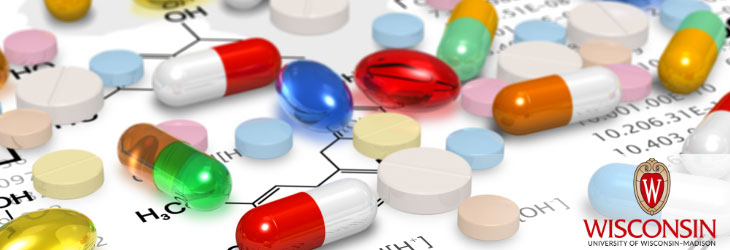Therapeutics & Vaccines

Glycomacropeptide (GMP)-Based Food for the Treatment of PKU and Other Metabolic Disorders
WARF: P09323US02
Inventors: Denise Ney, Mark Etzel
The Wisconsin Alumni Research Foundation (WARF) is seeking commercial partners interested in developing improved medical food for the nutritional management of phenylketonuria (PKU).
Overview
Phenylketonuria (PKU) is a genetic disorder in which an individual lacks the enzyme phenylalanine hydroxylase (PAH) that converts the amino acid phenylalanine into tyrosine. If left untreated, the buildup of phenylalanine in the blood can lead to mental retardation and central nervous system disorders.
The treatment for PKU is a lifelong reduced protein diet. Because most proteins contain significant amounts of phenylalanine, the specialized diet usually is protein poor and supplemented with other amino acids. This diet is difficult to follow, restrictive and unpalatable. Non-compliance is a common problem and can cause severe neuropsychological impairment.
The treatment for PKU is a lifelong reduced protein diet. Because most proteins contain significant amounts of phenylalanine, the specialized diet usually is protein poor and supplemented with other amino acids. This diet is difficult to follow, restrictive and unpalatable. Non-compliance is a common problem and can cause severe neuropsychological impairment.
The Invention
UW-Madison researchers have developed an improved medical food for treating PKU. This food is made with highly purified glycomacropeptide (GMP) as its primary protein source and supplemented with other amino acids, including arginine, histidine, leucine, tyrosine and tryptophan. It provides a complete, low-phenylalanine source of protein and is more palatable than the standard specialized diet.
GMP is a naturally occurring protein that is formed during cheese making and contains no phenylalanine. The purity of GMP is one key to producing this medical food. The other is the amount and type of amino acid supplementation. For example, if too many sulfur-containing amino acids are used, the food tastes bad and patients will not eat it.
GMP is a naturally occurring protein that is formed during cheese making and contains no phenylalanine. The purity of GMP is one key to producing this medical food. The other is the amount and type of amino acid supplementation. For example, if too many sulfur-containing amino acids are used, the food tastes bad and patients will not eat it.
Applications
- Nutritional management of PKU
Key Benefits
- Provides the highest quality, most effective medicinal foodstuff available for treating patients with PKU
- Provides a complete source of protein while reducing the levels of phenylalanine in the blood of patients with PKU
- Tastes good enough for patients to remain compliant with the diet
- Economically feasible to manufacture
- Can be produced as a variety of food types, including beverages, bars, wafers, puddings, gelatins, crackers, fruit leathers, nut butters, sauces, flakes, crisp cereal pieces, puffs, pellets and extruded solids
- May be used to treat other metabolic disorders in addition to PKU
Stage of Development
This food was successfully tested in human trials. It also was shown to support normal growth and reduce levels of phenylalanine in the blood and brain of PKU mice.
Additional Information
For More Information About the Inventors
Related Intellectual Property
Publications
- Ney D.M., Gleason S.T., van Calcar S.C., MacLeod E.L., Nelson K.L., Etzel M.R., Rice G.M. and Wolff J.A. 2009. Nutritional Management of PKU with Glycomacropeptide from Cheese Whey. J. Inherit. Metab. Dis. 32, 32-39.
- Ney D.M., Hull A.K., van Calcar S.C., Liu X. and Etzel M.R. 2008. Dietary Glycomacropeptide Supports Growth and Reduces the Concentrations of Phenylalanine in Plasma and Brain in a Murine Model of Phenylketonuria. J. Nutr. 138, 316-322.
- Solverson et al. 2012. Glycomacropeptide, a Low-Phenylalanine Protein Isolated from Cheese Whey, Supports Growth and Attenuates Metabolic Stress in the Murine Model of Phenylketonuria. Am. J. Physiol. (Endoc. & Metab.) 302, E885-E895.
- Solverson P., Murali S.G., Litscher S.J., Blank R.D. and Ney D.M. 2012. Low Bone Strength Is a Manifestation of Phenylketonuria and Is Attenuated by a Glycomacropeptide Diet. PLoS ONE. 7, e45165.
- van Calcar S.C., MacLeod E.L., Gleason S.T., Etzel M.R., Clayton M.K., Wolff J.A. and Ney D.M. 2009. Improved Nutritional Management of Phenylketonuria by Using a Diet Containing Glycomacropeptide Compared with Amino Acids. Am. J. Clin. Nutr. 89, 1068-77.
- Van Calcar S.C. and Ney D.M. 2012. Food Products Made with Glycomacropeptide, a Low-Phenylalanine Whey Protein, Provide a New Alternative to Amino Acid-Based Medical Foods for Nutrition Management of Phenylketonuria. J. Acad. Nutr. Diet. 112, 1201-1210.
- Click here for a news release describing this technology.
Tech Fields
For current licensing status, please contact Mark Staudt at [javascript protected email address] or 608-960-9845